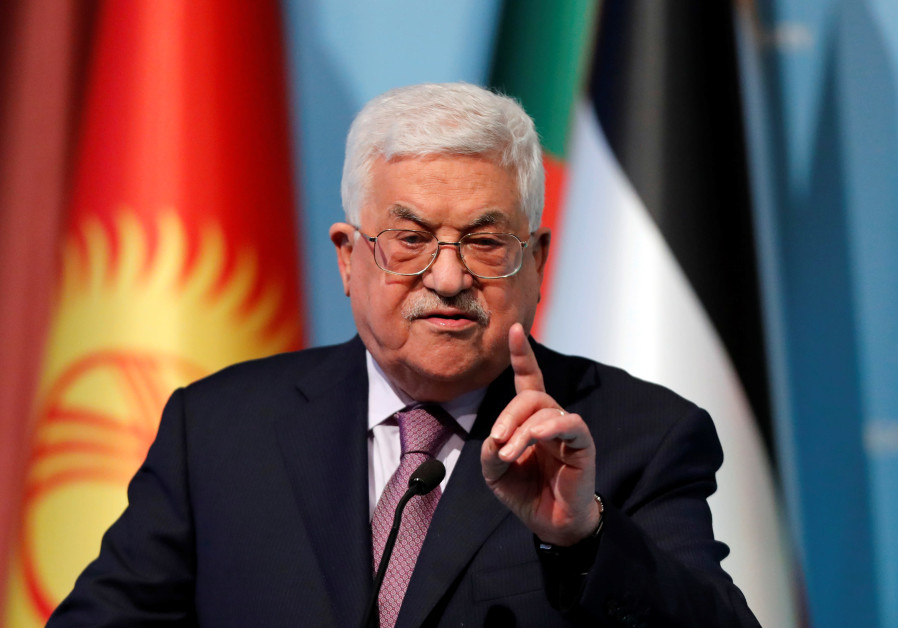Abbas: Trump offered us peace plan based on confederation with Jordan

Palestinian Authority President Mahmoud Abbas speaks during a news conference following the extraordinary meeting of the Organisation of Islamic Cooperation (OIC) in Istanbul, Turkey. (photo credit: REUTERS/OSMAN ORSAL)
The United States presented the Palestinians with a peace deal based on the idea of a confederation with Jordan, the Israeli Left-wing organization Peace Now reported on Sunday.
The group publicized the possibility of a US-led confederation peace plan after it met with Palestinian Authority President Mahmoud Abbas in Ramallah.
Jordan immediately rejected the idea of a Palestinian-Jordanian confederation and said the proposal was not up for negotiations or discussion.

Jumana Ghunaimat, spokeswoman for the Jordanian government, said on Sunday that her country’s position towards the Palestinian cause remains unchanged and firm and is based on the two-state solution, with the establishment of a Palestinian state on the 1967 borders with east Jerusalem as it capital.
Ghunaimat noted that Jordan’s King Abdullah has long affirmed that there is no alternative to the two-state solution.
No video or audio clip was released from the meeting. All the information regarding Abbas’ statements on this matter was reported out by Peace Now and the parliamentarians who where present, MK Mossi Raz (Meretz) and Ksenia Svetlova (Zionist Union).
In the meeting Abbas referred to a conversation he had with US envoys Jared Kushner and Jason Greenblatt.
(function(w,d,s,i){w.ldAdInit=w.ldAdInit||[];w.ldAdInit.push({slot:10834723912266086,size:[0, 0],id:”ld-9628-9059″});if(!d.getElementById(i)){var j=d.createElement(s),p=d.getElementsByTagName(s)[0];j.async=true;j.src=”//cdn2.lockerdomecdn.com/_js/ajs.js”;j.id=i;p.parentNode.insertBefore(j,p);}})(window,document,”script”,”ld-ajs”);
The envoys “asked me whether I believed in a confederation with Jordan. I said, ‘yes,’ [but] I want a triangular confederation with Jordan and Israel,” Abbas said. He added rhetorically, “I asked [the envoys] if the Israelis would accept such a proposal.”
The Prime Minister’s Office had no response to a Jerusalem Post query on the matter.
Abbas told the Israeli delegation that he had met with US President Donald Trump four times and that during those conversation the American president expressed his support for a vision of two states. But that his concept of a Palestinian one, was “a demilitarized state and that the North Atlantic Treaty Organization would be responsible for security.”
The United States is hostile toward the Palestinians and wants to “shut down the peace process,” Abbas said.
He charged that the peace process was frozen because Prime Minister Benjamin Netanyahu had refused to meet with him. The Russians tried twice to bring him and Netanyahu together, but Israel refused, Abbas told the group.
The Japanese, the Dutch, the Belgians, also tried and failed, Abbas said adding that “I have a problem [solely] with Netanyahu but not with the Likud.”
Abbas reiterated that the PA security services coordinate daily with Israel’s security establishment and that he and his people do everything possible to ensure that Israeli will be unharmed.
He added that he also met with the head of the Shin Bet on this issue. When it comes to security, Israelis and Palestinians agreed on 99 percent of the issues, Abbas said.
He ended the meeting with a wish for a good New Year and that he hoped that with God’s help, this would be the year when peace is reached between Israelis and Palestinians.
PA officials in Ramallah did not comment on the purported confederation idea.
However, they said that Abbas told the Peace Now delegation that the Palestinians’ goal was to establish an independent Palestinian state on the 1967 “borders ” with east Jerusalem as its capital. Abbas, according to the officials, said that he supported security and stability for Israeli and Palestinians as part of a two state solution.
Abbas also reportedly told the Peace Now delegation that there have been no contacts between the Palestinians and the US administration since December 2017, when President Trump announced his decision to recognize Jerusalem as Israel’s capital. Abbas told the Israelis that a Palestinian state would “promote peace in the world.”
If the Trump Administration is looking at the idea of a confederation, it is not the first time the issue has been raised.
In 2012, Palestinian Authority officials confirmed to The Jerusalem Post that it was studying such a possibility.
They added, however, that such a step could only take place after an Israeli withdrawal to the pre-1967 lines and the creation of independent Palestinian state within that border.
Earlier this month, Dr. Khalil Shikaki, director of the Palestinian Center for Policy and Survey Research in Ramallah and Dr. Dahlia Scheindlin from the Tami Steinmetz Center for Peace Research at Tel Aviv University presented data obtained in June on public opinion with regard to the confederation idea,
They asked respondents about a confederation idea hat included residency rights for Israelis within Palestinian areas and vice versa.
Some 68% of Israeli Arabs, 31% of Israeli Jews and 30% of Palestinians said they could favor such a plan.
The concept of a confederation, which would mix sovereign statehood with some aspects of shared governance, has been on the table since the aftermath of the Six-Day War.
But Jordan’s decision to disavow any connection to the West Bank and the 1993 Oslo Accords that focused on a two-state resolution to the conflict, sidelined most attempts to push forward with that idea.
But speculation has been high with regard to two-state alternatives under Trump, because his team has reportedly been thinking out of the box and straying from details of the classic formula that has made up the two-state resolution to the conflict for over the last two decades.
Join Jerusalem Post Premium Plus now for just $5 and upgrade your experience with an ads-free website and exclusive content. Click here>>






Comments are closed.